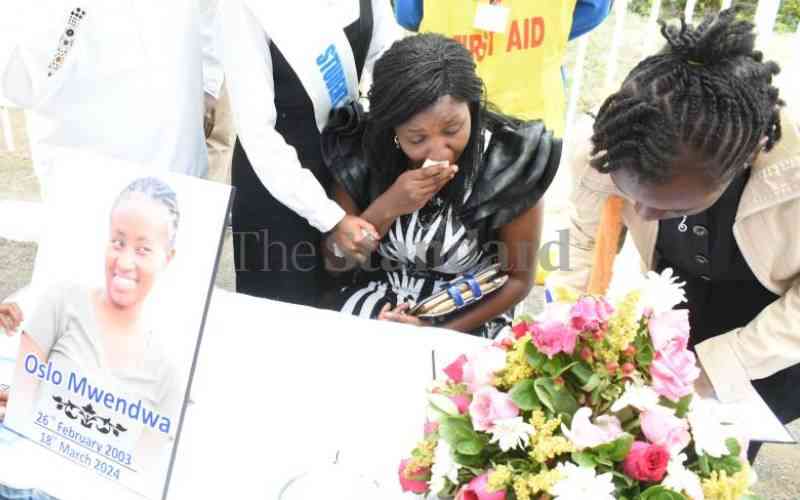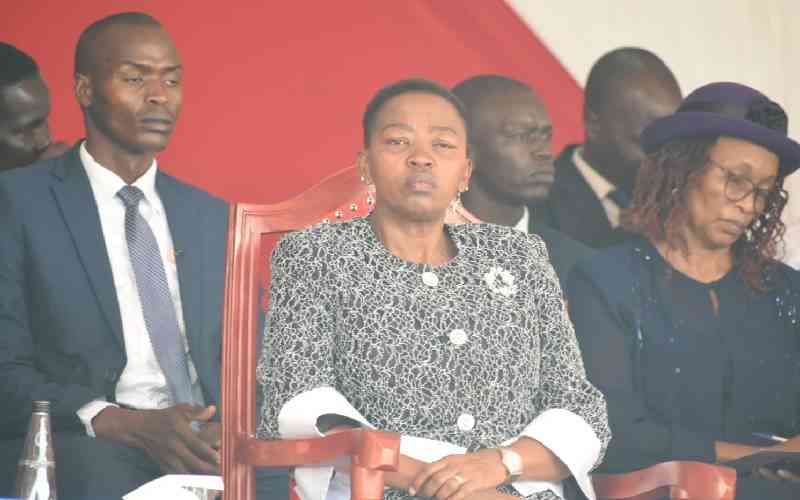Nairobi; Kenya: Nevertheless, in Mazrui, I saw a man with the gift of the gab (if you will excuse the cliché), but who could use his formidable speaking skills to defend the indefensible. His predominantly American audience jumped at him, but the Kenyan academic warrior was not willing to concede.
In 1991, I applied to the Fulbright Foundation for a fellowship so that I could spend my sabbatical leave in America. The application was turned down. But towards the end of that year, Marcum came to Kenya.
When I told him about the fate of my application, he said I should have told him before I applied, “I used to be a member of their board, and I still have some connections,” the professor said with quiet confidence.
After Marcum left, I received a letter from the American Embassy requesting me to resubmit my application.
But my ego had been bruised — and the proud Luhya in me who went to the river refused to reapply. So I assumed the story had ended there. However, in 1992 I got a letter from the Fulbright Foundation offering me the fellowship I had applied for, and informing me that I would spend my sabbatical leave at the University of Iowa.
My sponsors organised and funded several trips for me, one of which was to attend a conference of the African Studies Association in Seattle. And as luck would have it, one of the objectives of this particular conference was to honour Mazrui on his sixtieth birthday and to assess his scholarly output.
So, once again I was destined to meet and interact with the legendary Kenyan thinker and academician. The organisers had invited Wole Soyinka, Nigeria’s literary icon, to deliver the keynote address. Predictably, the Nobel laureate did not show up.
I say “predictably” because Soyinka hated Mazrui, and he did not have the decency to hide it. The two giants had quarreled over Mazrui’s BBC television series called Africans: The Triple Heritage.
ANIMISM, CHRISTIANITY AND ISLAM
Mazrui’s view was that Africa’s heritage had three strands: Animism, Christianity and Islam.
Soyinka had countered this by arguing rather disingenuously that Christianity and Islam were not part of our heritage, and that instead they were interferences.
Many of us scholars thought the Nigerian writer was quibbling over semantics, and that we could not rewrite our African history.
Be that as it may, Soyinka was unbending and dogmatic about his stance, and so he declined to attend a conference in which his detractor was being honoured.
Our own Micere Mugo spoke at this conference. But sounding like a record that was stuck, she criticised what she saw as Mazrui’s pro-imperialist positions.
Mind you, this was 1992: the Cold War had ended, the Soviet Union had collapsed, and global socialism had been dismantled.
Stay informed. Subscribe to our newsletter
So, as I listened to my former colleague at the University of Nairobi tearing into Mazrui’s ideas, I wondered if she even knew that in that election year our opposition parties were competing with KANU in advocating for closer ties with the so-called imperialists.
But what really jumped out at me at this conference was a presentation by an American scholar who argued that the Kenyan professor was not a true political scientist. According to the American, Mazrui’s research methodology was not scientific, and he only wrote opinionated essays on world politics. From the point of view of this gentleman, whose name I have forgotten, Mazrui was at best a literary essayist.
Although I did not voice key concerns, I took offence at the insinuation that literary essays were easier to write and that no methodology accompanied this genre of writing.
But that was neither here nor there. The presentation by the American academic was, however, provocative in the superlative degree and the question that has refused to go away is how do our own African political scientists assess the academic legacy of the continent’s most prolific author? Or do we say with the singer that the answer to this question is blowing in the wind?
Long before I met Mazrui in person, I had of course read the articles he wrote in Transition, the iconic social science journal that was nevertheless sponsored by the CIA.
There was the one he titled Kwame Nkrumah: The Leninist Czar which angered many progressives and admirers of the Ghanaian leader. Then there was the one in which Mazrui, probably thinking of himself as an example, defined an intellectual as somebody who is fascinated by ideas and whose primary duty is to manipulate those ideas.
Again, progressives were up in arms against him.They wanted to see an intellectual as an agent of change, as somebody who plotted to remake the world.
TOWERED ABOVE TRIBAL PRIMITIVITY
I had also read his so-called novel of ideas, that unwieldy work of fiction titled The Trial of Christopher Okigbo.
The controversial author described himself as a liberal. The synonyms for “liberal” in my thesaurus are: broad-minded, open-minded, enlightened, tolerant, lenient, unprejudiced, unbiased, and impartial.
Over the years, the word has acquired the connotations of progressive, reformist, forward-looking, advanced, radical, and moderate. Yet when we were younger and more idealistic, “liberal” was a dirty word. We equated it with Western imperialism. And even in the West today, when the Republicans describe Barack Obama as the most liberal president in their history they mean “the worst president.”
But as I interacted with Mazrui here and abroad, I kept wondering whether there was something I had missed about the essence of the man, about his inner being, and about his world view.
Why did be believe so doggedly and so tenaciously in the liberal ideal? And might this have had something to do with his vision of Kenya, his vision of Africa, and his vision of the world?
In my long life in academia, I have interacted with many scholars. The typical Kenyan professor is a shameless tribalist — but Ali Mazrui towered loftly above this primitivity.
And before my fellow professors start yelling and screaming at me, let me illustrate my point.
The late Francis Imbuga and I were friends and classmates at the University of Nairobi, and we used to confide in each other.
One day, when I had gone to visit him at Kenyatta University, the famous playwright spoke feelingly about Mazrui, who was then the chancellor of Jomo Kenyatta University of Agriculture and Technology.
“You know,” he said in a husky, whispery voice, “if it wasn’t for Professor Mazrui, my wife would not be Vice Chancellor of JKUAT.”
According to the late dramatist, the dark forces of tribalism and male chauvinism had combined to block her appointment, but the good professor stood by her.
Ali Mazrui was looking for academic, professional, and administrative abilities, not tribe or gender, and he remained true to his liberal ideal — the ideal of fairness and openness.
That was the Ali Mazrui that I knew and interacted with — a true Kenyan and a good human being.
 The Standard Group Plc is a
multi-media organization with investments in media platforms spanning newspaper
print operations, television, radio broadcasting, digital and online services. The
Standard Group is recognized as a leading multi-media house in Kenya with a key
influence in matters of national and international interest.
The Standard Group Plc is a
multi-media organization with investments in media platforms spanning newspaper
print operations, television, radio broadcasting, digital and online services. The
Standard Group is recognized as a leading multi-media house in Kenya with a key
influence in matters of national and international interest.
 The Standard Group Plc is a
multi-media organization with investments in media platforms spanning newspaper
print operations, television, radio broadcasting, digital and online services. The
Standard Group is recognized as a leading multi-media house in Kenya with a key
influence in matters of national and international interest.
The Standard Group Plc is a
multi-media organization with investments in media platforms spanning newspaper
print operations, television, radio broadcasting, digital and online services. The
Standard Group is recognized as a leading multi-media house in Kenya with a key
influence in matters of national and international interest.








